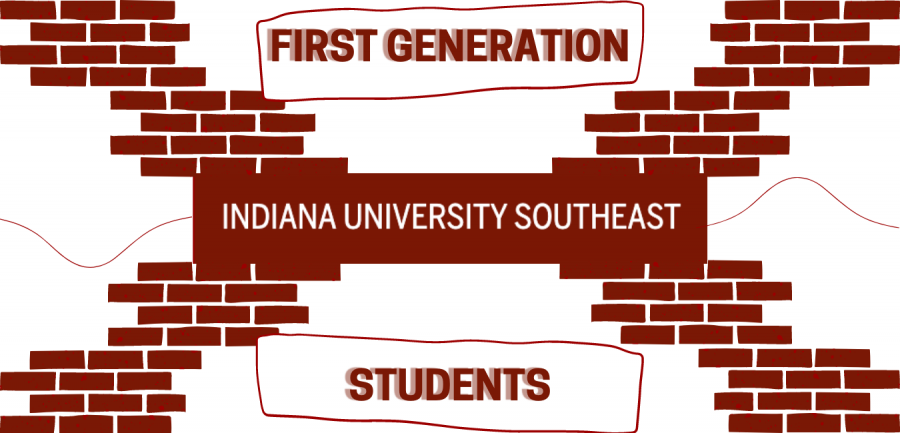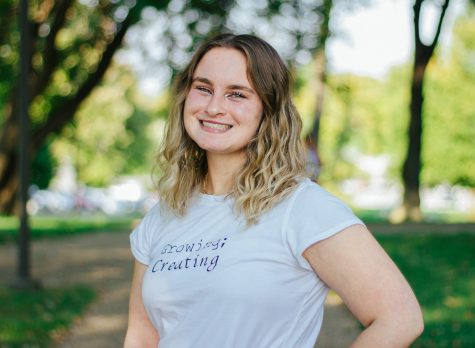IUS’s First Generation Students
First-generation students at IU Southeast may feel like they’re struggling at times, but campus organizations offer support and encouragement for those who need it
April 30, 2021
Doing things for the first time in our lives is always a little scary. Whether it be a first kiss, your first job, your first adult purchase or even trying sushi for the first time, these things always seem to make us a tad bit nervous, but what about being the first person in your family to go to college? Maybe that’s you, maybe it isn’t.
Either way, coming to college is inevitably nerve-racking, but then put the weariness of finances, a lack of parental or guardian guidance and feeling completely alone at times on top of it.
First-generation students at IU Southeast are of abundance and excel just as much as those that are second, third, fourth and so on generation students. It is by no means the statement of “first-generation students work harder,” but rather that they take on different obstacles compared to the others.
These students may feel as though they have nowhere to turn to for an understanding of what they are going through. This label of being “first-generation students” is not plastered onto their foreheads, so finding one another amongst it all can also be a bit of a scrutiny as well.
Yet as of November 8, 2020, a new group has developed on campus and shared their first induction ceremony via Zoom.
Tri-Alpha: The original honor society for first generation students
The newest honor society at IUS, Tri-Alpha, specializes in helping first-generation students succeed in numerous ways. It offers a great amount of resources from pairing mentorships to bringing social awareness to the campus and the members as well about being a first-generation student.
Sally Eads, the current primary contact for Tri-Alpha, said that the honor society has been able to have Zoom meetings with different faculty and staff that were first-generation students themselves to share their own stories.
“Our overarching goal is to have some things in place to help first-generation students,” Eads said. “It’s a place to help them feel safe, ask questions and things like that.”
When speaking with current Tri-Alpha members, a lot was to be shared.
Jomar Sullivan, a junior majoring in accounting, recalled how much stress he endured when first applying to college while still in high school.
“I stressed each and every day about the scholarships and how to even pay for school,” he said.
Sullivan never received a full ride scholarship and explained that his family had to pay out of pocket for him to attend school.
“Watching my family sacrifice their money that they could have used for themselves on me was hard,” he said.
He said the guilt overrode him in the beginning, but now after being part of Tri-Alpha, he has realized that his family was not the only one who made those types of sacrifices.
Sullivan, along with many others, advocated that pure self-will was the thing that pushed them the most as a first-generation student.
“I thought about what I had to do to succeed and the life I dreamed of just to step out of bed,” he said.
Tri-Alpha has not only brought first-generation students together and enhanced their encouragement, but it has also given a great backbone to help support the academic, psychological and financial obstacles to these students as well.
“You will have people that will help you throughout your problems,” Sullivan said.
Another first-generation student, Samara Grant, is part of the Tri-Alpha National Honor Society. Grant is a biology major. Her story begins in Rio de Janeiro, Brazil.
“I am the first one in my family to come to America, become a citizen and go to college,” she said.
Grant takes the meaning of “first-generation” to a whole new level. She recalled that leaving her loved ones and her home behind in 2014 was terrifying.
“But here I am, first-generation in college, first-generation in the USA and a first-generation citizen,” she said.
Both Sullivan and Grant shared that Tri-Alpha has allowed them to feel more confident about not just their college experience but also what comes after is as well.
“Tri-Alpha gave me the ability to connect with others like me and more connections with adults that can help me in the future,” Sullivan said.
All in all, the members and Eads have big visions for Tri-Alpha’s future.
“I would love to see it become a whole organization and Tri-Alpha be part of that,” Eads said.
She then continued by explaining that IUS should try to form a first-generation organization and then to incorporate Tri-Alpha as a sub part.
“As the community grows, the better and more helpful everything will be for the first-generation students.” Sullivan said.
“I believe that we are on the right track for success and exceeding expectations.”



